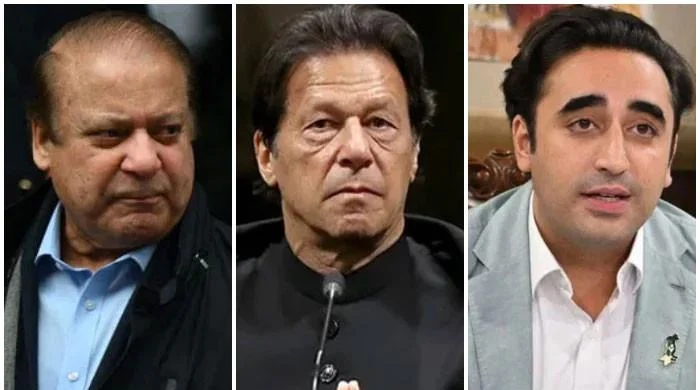Major political parties to dominate Senate despite retirement
PPP and PML-N to lose 11 and 12 senators, respectively.
Only seven PTI senators out of its 24 lawmakers are to retire.
Raza Rabbani, Ishaq Dar among bigwigs retiring on March 11.
Despite several lawmakers set to retire on March 11, the three major political parties including the Pakistan Muslim League-Nawaz (PML-N), Pakistan Peoples’ Party (PPP) and Pakistan Tehreek-e-Insaf (PTI) are likely to maintain their dominance in the Senate, The News reported on Monday.
The PML-N and the PPP, after demonstrating their strength in the provincial assemblies following the February 8 polls, are likely to pose a threat to the PTI which has the potential to emerge as the largest party in the upper house of the parliament on condition that it manages to circumvent the plethora of legal challenges currently being faced by the party.
It is pertinent to know that senators are elected for a six-year term, however, half of them retire every three years, and elections are held for new members, as the Senate is the only legislature that is not subject to dissolution.
The term-wise data of senators reveals that the PML-N will lose 11 out of its 16 members, whereas the PPP will fall short of 12 out of its 21 members, as they complete their six-year term.
However, the PTI, which made its way to the Senate for the first time in 2015, will lose only seven out of its 24 members, and hence, will still have 17 remaining in the House even prior to Senate polls.
Subject to clearance from the Election Commission of Pakistan (ECP) regarding its intra-party polls, fixed for March 3 and other legal matters, PTI is in a position to possibly outnumber the other two major political parties because of its numerical dominance in Khyber Pakhtunkhwa (KP) Assembly and significant presence in Punjab Assembly.
The full strength of the Senate has been 100, including 23 members each from the four federating units, and four each from erstwhile FATA and Islamabad.
The 23 seats allocated to a province comprise 14 general seats, four reserved for women, four for technocrats and one for a minority member. However, now only 96 members will be part of the House, for the representation of the erstwhile tribal areas will end, following the 25th constitutional amendment which merged them with KP.
Accordingly, the upcoming Senate polls will see 48 new senators, 11 each from all four provinces on general and technocrats seats, two from Islamabad and two minority members from Punjab and Sindh as well, being elected to the upper house.
The Senate presently consists of 97 members, due to the death of PML-N’s Rana Maqbool Ahmed and the resignation of Shaukat Tarin.
Likewise, Balochistan Awami Party’s (BAP) Anwaar-ul-Haq Kakar also resigned after assuming the office of the caretaker prime minister.
While PTI’s 17 members will exhaust their term in 2027, the seven retiring next month PTI members include the leader of the opposition Dr Shahzad Waseem.
Other prominent senators set to retire include PPP’s Mian Raza Rabbani, Maula Bux Chandio and Quratulain Marri.
Similarly, leaders of the House Ishaq Dar and Mushahid Hussain Syed are among PML-N’s legislators bowing out next month. Five members, belonging to BAP, are also completing their term and the most prominent among them is Senate Chairman Sadiq Sanjrani.
Meanwhile, two senators each from the Jamiat Ulema-e-Islam-Fazl (JUI-F) and the National Party (NP) whose term will end on March 11.
Former law minister Farogh Naseem is the only senator from the Muttahida Qaumi Movement-Pakistan (MQM-P), who will complete his term.
The Pashtunkhwa Milli Awami Party (PKMAP), PML-Functional and Jamaat-e-Islami (JI) have one senator retiring in March.
All six independent senators in the present House are also set to retire in March and they are Deputy Senate Chairman Mirza Muhammad Afridi, Dilawar Khan, Hidayatullah, Hilal-ur-Rehman, Naseebullah Bazai and Shamim Afridi.
It is quite likely that a few of those, who are retiring, may return to the House, after the Senate elections. This depends on their respective party’s priorities as well as their numerical presence in the respective legislatures.
In the backdrop of their power-sharing deal, it is obvious, that PPP will most likely field its candidate for the slot of chairman Senate, who will be supported by PML-N and their other allies.
Elections to fill the seats allocated to each province are held in accordance with the system of proportional representation, by means of the single transferable vote, and members of each provincial assembly elect their respective representatives, whereas members of the National Assembly vote to elect senators from Islamabad.
Chapter VII of the Elections Act, 2017, deals with the Senate elections while Section 107 reads: “Notification for election.—(1) The Commission shall, by notification in the official Gazette, call upon the members of the assembly of a province or, as the case may be, the National Assembly to elect such number of members to the Senate from that province or the Islamabad, as the case may be, as is specified in the notification.”

